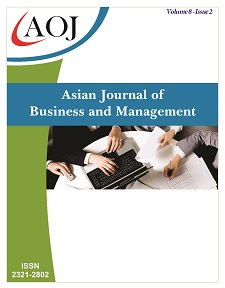Influence of Globalisation on Project Delivery and Organisational Performance
DOI:
https://doi.org/10.24203/ajbm.v8i2.6187Abstract
The study is an empirical analysis of the influence of globalization on project delivery and organisational performance. This is borne out of the problem that globalization is an ambivalent concept and process with its strengths, weaknesses, opportunities and threats (SWOT) or with costs, benefits and burdens. The objectives of the study are to examine the significant influence of economic liberation on project delivery and organisational performance; to examine the significant influence of technological innovation on organizational performance and project delivery. Being an empirical development research, the survey research design involving the collection, collation and use of primary and secondary data from a representative sample population of 150 (one hundred and fifty) respondents was used. Descriptive and inferential statistics with the aid of the Statistical Package for Social Sciences (SPSS) were used in data presentation, analysis and test of hypotheses in which all null hypotheses were rejected in favour of the alternate hypotheses which were accepted. Based on the findings, the following recommendations were made; in the opening of economic borders and removal of trade barriers, nation’s economic flows should be increased to enable firm’s increase their productivity and efficiency and Company management should try to devise strategies to fulfill consumer perspective to survive in competitive market.
References
Adei, S. (2004). Impact of globalization on management: The African perspective. management in Nigeria. Journal of Nigerian Institute of Management, 39/40(1/2), 3-15.
Andersson, P. & Mattsson, L. (2010). Temporality of resource adjustments in business networks during severe economic recession, Industrial Marketing Management, 39 (6), 917 – 924.
Armstrong, M. (2009). Armstrong’s Handbook of Human Resource Management Practice. London:Kogan Page.
Ayantayo, J. K. (2004). Globalization: a new ethnocentric culture with impact on African social values. International Review of Politics and Development, 2(2), 54-64.
Chimerine, L. (1997). The new economic realities in business. McKinsey Quarterly, 86(1), 12-17.
Dada, S. O. (2004). Globalization and the future of sovereignty. International Review of Politics and Development, 2(2), 24-39.
Dille, T. & Söderlund, J. (2011). Managing inter-institutional projects: The significance of isochronism, timing norms and temporal misfits. International Journal of Project Management, 29 (4), 480-490.
Ejiogu, V. C., Onuoha, B. C. & Nwede, I. G. N. (2017). Globalization and performance of manufacturing firms in Port Harcourt. International Journal of Advanced Academic Research, 3(11), 2.
Heffernan, M. M. & Flood, C. P. (2000). An exploration of the relationship between managerial competitive organizational characteristic and performance in an organization. Journal of European industrial training university press, 128-136.
Iheriohanma, E. B. J. (2008). The challenges of globalization and poverty in the third world: A sociological discourse of nigeria’s situation. In J. O. Onwuka, (ed) The Third World in Sociological Perspective. Okigwe: FERP-FASMEN, 241-255.
Lebans, M. & Euske, K. (2006). A conceptual and operational delineation of performance. Business performance Measurement. Cambridge University Press.
Liberatore, M. J. & Pollack-Johnson, B. (2003). Factors influencing the usage and selection of project management software. IEEE Transactions on Engineering Management. 50 (2), 164–174.
Lushaus, C. & Adrien, M. H. (1998). Organizational assessment. A review of experience universalia, 31
Raymond, L. & Bergeron, F. (2008). Project management information systems: An empirical study of their impact on project managers and project success. International Journal of Project Management, 26 (1), 213 – 220, doi:10.1016. .
Sharma, B. & Gadenne, D. (2002). An inter–industry comparison of quality management practices and performance. Managing Service Quality, 12(6).
Upadhaya, B., Munir, R. & Blount, Y. (2014). Association between performance Measurement systems and Organisational Effectiveness. International journal of operations & Production management, 34(7), 2.
Wokoma, C. U. & Iheriohanma, E. B. J. (2010). Interaction between globalization and organizational performance in the third world: Nigeria in focus. Studies of sociology of science, 1(2), 72-80.
Downloads
Published
Issue
Section
License
Copyright (c) 2020 Asian Journal of Business and Management

This work is licensed under a Creative Commons Attribution-NoDerivatives 4.0 International License.
- Papers must be submitted on the understanding that they have not been published elsewhere (except in the form of an abstract or as part of a published lecture, review, or thesis) and are not currently under consideration by another journal published by any other publisher.
- It is also the authors responsibility to ensure that the articles emanating from a particular source are submitted with the necessary approval.
- The authors warrant that the paper is original and that he/she is the author of the paper, except for material that is clearly identified as to its original source, with permission notices from the copyright owners where required.
- The authors ensure that all the references carefully and they are accurate in the text as well as in the list of references (and vice versa).
- Authors retain copyright and grant the journal right of first publication with the work simultaneously licensed under a Creative Commons Attribution License that allows others to share the work with an acknowledgement of the work's authorship and initial publication in this journal.
- Authors are able to enter into separate, additional contractual arrangements for the non-exclusive distribution of the journal's published version of the work (e.g., post it to an institutional repository or publish it in a book), with an acknowledgement of its initial publication in this journal.
- Authors are permitted and encouraged to post their work online (e.g., in institutional repositories or on their website) prior to and during the submission process, as it can lead to productive exchanges, as well as earlier and greater citation of published work (See The Effect of Open Access).
- The journal/publisher is not responsible for subsequent uses of the work. It is the author's responsibility to bring an infringement action if so desired by the author.


